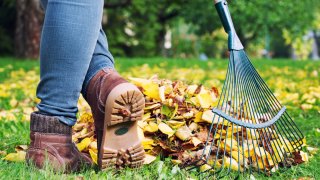

The following content is created in partnership with Washington D.C. Department of Public Works. It does not reflect the work or opinions of the NBC Washington editorial staff. Click here to learn more about the DPW.
Fall foliage: That which sets tree branches ablaze in October eventually morphs into a big chore piled all over your lawn by November. Raking these leaves can be tedious and syphon precious hours from your weekend (or dollars from your pocket if you outsource the job). So why do it?
Here’s what happens when we rake (or blow, or pick up with a lawnmower, or mulch), and what happens when we don’t.
We're making it easier for you to find stories that matter with our new newsletter — The 4Front. Sign up here and get news that is important for you to your inbox.
When we rake, we . . .
. . . get to show off our lawns: Before winter dormancy sets in, many lawns are still vibrant green. Paired against the fiery reds and golden yellows of the leaves still in the trees, a bare lawn is still a lovely sight.
. . . prep our lawns for spring: When leaves cover lawns for extended times during the fall, grass gets deprived of sunlight—and air, too (lawns like to breathe, like everything else). This can lead to lackluster-looking grass come spring and brown patches. Keeping the laws open to sun and air makes for a prettier, healthier lawn in spring.
. . . obey laws: D.C. residents are required to dispose of leaves.
. . . can create compost piles: There may be areas of your property that can actually benefit from piles of leaves—vegetable gardens, for instance. Move some leaves there over the winter, and you’re promoting the growth of nutrients that can feed microbes in the dirt and create richer soil.
When we don’t rake, we . . .
. . . risk the wrath of neighbors: Do you want to be the resident whose unraked leaves blow all over the neighbors’ tidy yards?
. . . create hazards: Should piles of leaves find their way into the street, they can create a fire hazard and create parking and traffic issues.
. . . cause flooding: Leaves can clog storm drains, cause street flooding, and eventually pollute the Chesapeake Bay and other bodies of water. Proper leaf collection and disposal help keep our rivers and streams healthy.
. . . invite pests: Rotting leaves can make great cover for pests—who can later invade your home.
When we rake this year . . .
Note that the District of Columbia’s vacuum leaf program resumed November 9th—thus paper bags are no longer needed. Now residents are asked to rake their leaves to the curb or (should they have one) into the tree box in front of their residence the Sunday before scheduled leaf collection.
To help ease the vacuum process, residents are also asked to keep vehicles away from the curb lanes on scheduled collection days.
To learn more about the District’s 2020 leaf collection program, click here.

